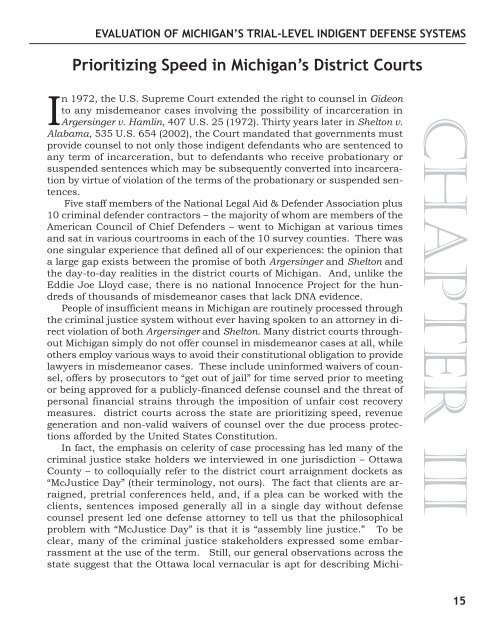Evaluation of Trial-Level Indigent Defense Systems in Michigan
Evaluation of Trial-Level Indigent Defense Systems in Michigan
Evaluation of Trial-Level Indigent Defense Systems in Michigan
You also want an ePaper? Increase the reach of your titles
YUMPU automatically turns print PDFs into web optimized ePapers that Google loves.
EVALUATION OF MICHIGAN’S TRIAL-LEVEL INDIGENT DEFENSE SYSTEMS<br />
Prioritiz<strong>in</strong>g Speed <strong>in</strong> <strong>Michigan</strong>’s District Courts<br />
In 1972, the U.S. Supreme Court extended the right to counsel <strong>in</strong> Gideon<br />
to any misdemeanor cases <strong>in</strong>volv<strong>in</strong>g the possibility <strong>of</strong> <strong>in</strong>carceration <strong>in</strong><br />
Argers<strong>in</strong>ger v. Haml<strong>in</strong>, 407 U.S. 25 (1972). Thirty years later <strong>in</strong> Shelton v.<br />
Alabama, 535 U.S. 654 (2002), the Court mandated that governments must<br />
provide counsel to not only those <strong>in</strong>digent defendants who are sentenced to<br />
any term <strong>of</strong> <strong>in</strong>carceration, but to defendants who receive probationary or<br />
suspended sentences which may be subsequently converted <strong>in</strong>to <strong>in</strong>carceration<br />
by virtue <strong>of</strong> violation <strong>of</strong> the terms <strong>of</strong> the probationary or suspended sentences.<br />
Five staff members <strong>of</strong> the National Legal Aid & Defender Association plus<br />
10 crim<strong>in</strong>al defender contractors – the majority <strong>of</strong> whom are members <strong>of</strong> the<br />
American Council <strong>of</strong> Chief Defenders – went to <strong>Michigan</strong> at various times<br />
and sat <strong>in</strong> various courtrooms <strong>in</strong> each <strong>of</strong> the 10 survey counties. There was<br />
one s<strong>in</strong>gular experience that def<strong>in</strong>ed all <strong>of</strong> our experiences: the op<strong>in</strong>ion that<br />
a large gap exists between the promise <strong>of</strong> both Argers<strong>in</strong>ger and Shelton and<br />
the day-to-day realities <strong>in</strong> the district courts <strong>of</strong> <strong>Michigan</strong>. And, unlike the<br />
Eddie Joe Lloyd case, there is no national Innocence Project for the hundreds<br />
<strong>of</strong> thousands <strong>of</strong> misdemeanor cases that lack DNA evidence.<br />
People <strong>of</strong> <strong>in</strong>sufficient means <strong>in</strong> <strong>Michigan</strong> are rout<strong>in</strong>ely processed through<br />
the crim<strong>in</strong>al justice system without ever hav<strong>in</strong>g spoken to an attorney <strong>in</strong> direct<br />
violation <strong>of</strong> both Argers<strong>in</strong>ger and Shelton. Many district courts throughout<br />
<strong>Michigan</strong> simply do not <strong>of</strong>fer counsel <strong>in</strong> misdemeanor cases at all, while<br />
others employ various ways to avoid their constitutional obligation to provide<br />
lawyers <strong>in</strong> misdemeanor cases. These <strong>in</strong>clude un<strong>in</strong>formed waivers <strong>of</strong> counsel,<br />
<strong>of</strong>fers by prosecutors to “get out <strong>of</strong> jail” for time served prior to meet<strong>in</strong>g<br />
or be<strong>in</strong>g approved for a publicly-f<strong>in</strong>anced defense counsel and the threat <strong>of</strong><br />
personal f<strong>in</strong>ancial stra<strong>in</strong>s through the imposition <strong>of</strong> unfair cost recovery<br />
measures. district courts across the state are prioritiz<strong>in</strong>g speed, revenue<br />
generation and non-valid waivers <strong>of</strong> counsel over the due process protections<br />
afforded by the United States Constitution.<br />
In fact, the emphasis on celerity <strong>of</strong> case process<strong>in</strong>g has led many <strong>of</strong> the<br />
crim<strong>in</strong>al justice stake holders we <strong>in</strong>terviewed <strong>in</strong> one jurisdiction – Ottawa<br />
County – to colloquially refer to the district court arraignment dockets as<br />
“McJustice Day” (their term<strong>in</strong>ology, not ours). The fact that clients are arraigned,<br />
pretrial conferences held, and, if a plea can be worked with the<br />
clients, sentences imposed generally all <strong>in</strong> a s<strong>in</strong>gle day without defense<br />
counsel present led one defense attorney to tell us that the philosophical<br />
problem with “McJustice Day” is that it is “assembly l<strong>in</strong>e justice.” To be<br />
clear, many <strong>of</strong> the crim<strong>in</strong>al justice stakeholders expressed some embarrassment<br />
at the use <strong>of</strong> the term. Still, our general observations across the<br />
state suggest that the Ottawa local vernacular is apt for describ<strong>in</strong>g Michi-<br />
CHAPTER III<br />
15



